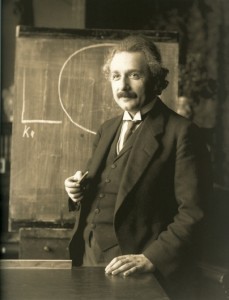
In August 1939, one month before the start of World War II, Einstein sent a letter to the U.S President Roosevelt recommending the utilization of nuclear chain reactions to create an atomic bomb. In his letter, Einstein explains the ravage that can be made by such a bomb to sea ports. He goes even further and suggests from where Uranium can be purchased.
The letter was originally written by Leó Szilárd, a Hungarian physicist and inventor who was deeply involved in the study of the nuclear chain reactions. With the support of Edward Teller and Eugene Wigner, two fellow Hungarian physicists, he had persuaded Einstein to sign and send the letter to President Roosevelt. Their insistence was driven by a major scientific event: the discovery of the nuclear fission in December 1938. The importance of that discovery comes not only from its scientific value but from the fact that it was published by German scientists, Otto Hahn, and Fritz Strassmann, in a German scientific journal. It was obvious that the Nazi regime will do all what can be done to implement the destructive force of nuclear fission in its war machine. Indeed, The German nuclear weapon project started in April 1939.The letter was delivered by the economist Alexander Sachs in October 11. Roosevelt answered it twice. First in October 17, 1939 in a brief acknowledgement written by his Secretary. Second in October 19, in a letter signed by the president himself. This double feedback shows the intense excitement with which Roosevelt received Einstein’s correspondence. Within few days, the Advisory Committee on Uranium was created.
Herein the letter’s text:
Sir:
Some recent work by E. Fermi and L. Szilard, which has been communicated to me in manuscript, leads me to expect that the element uranium may be turned into a new and important source of energy in the immediate future. Certain aspects of the situation which has arisen seem to call for watchfulness and if necessary, quick action on the part of the Administration. I believe therefore that it is my duty to bring to your attention the following facts and recommendations.
In the course of the last four months it has been made probable through the work of Joliot in France as well as Fermi and Szilard in America–that it may be possible to set up a nuclear chain reaction in a large mass of uranium, by which vast amounts of power and large quantities of new radium-like elements would be generated. Now it appears almost certain that this could be achieved in the immediate future. This new phenomenon would also lead to the construction of bombs, and it is conceivable–though much less certain–that extremely powerful bombs of this type may thus be constructed. A single bomb of this type, carried by boat and exploded in a port, might very well destroy the whole port together with some of the surrounding territory. However, such bombs might very well prove too heavy for transportation by air.
The United States has only very poor ores of uranium in moderate quantities. There is some good ore in Canada and former Czechoslovakia, while the most important source of uranium is in the Belgian Congo.
In view of this situation you may think it desirable to have some permanent contact maintained between the Administration and the group of physicists working on chain reactions in America. One possible way of achieving this might be for you to entrust the task with a person who has your confidence and who could perhaps serve in an unofficial capacity. His task might comprise the following: a) to approach Government Departments, keep them informed of the further development, and put forward recommendations for Government action, giving particular attention to the problem of securing a supply of uranium ore for the United States.
b) to speed up the experimental work, which is at present being carried on within the limits of the budgets of University laboratories, by providing funds, if such funds be required, through his contacts with private persons who are willing to make contributions for this cause, and perhaps also by obtaining co-operation of industrial laboratories which have necessary equipment.
I understand that Germany has actually stopped the sale of uranium from the Czechoslovakian mines which she has taken over. That she should have taken such early action might perhaps be understood on the ground that the son of the German Under-Secretary of State, von Weizsacker, is attached to the Kaiser-Wilhelm Institute in Berlin, where some of the American work on uranium is now being repeated. Yours very truly,
Albert Einstein